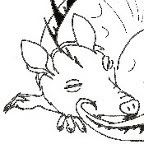 Twilight
Twilight,
New Moon,
Eclipseby Stephenie Meyer
As I've said on a
post on my main blog, once I read Eclipse, I had to go back through and read the others again, and then re-read Eclipse
again, too. And this last re-reading of the whole series brought new perspective for me—on the whole series.
There is a lot to be said about these books, and right now, all over the Internet, people are saying it. I have read complaints about inaccuracy (Forks isn't really like that, in
New Moon Alice gave a guard a thousand dollar bill, and those don't
exist, etc.), that the books aren't written very well, people debating about the characters: who they like, who they dislike, and why (and of course, "like" and "dislike" are completely mild—
love passionately and
loathe fit the bill a little better), some who claim that Stephenie is "dangerous" because the books depict an abusive relationship—there have been some really strange things coming out of the woodwork from these books.
To me, though, it's all the discussion
about the books that is intriguing: why is a silly romantic YA
fantasy getting so much attention? Stirring so much feeling? When you look at the plain fact that it's a teenage romance in which there is NO SEX—really, what's the big deal? A YA romance novel—eliciting controversy!
I have a theory about this kind of thing, but was having trouble articulating it. Then I happened to read the preface of the next book on my list, and found Oscar Wilde already described it perfectly:
"All art is at once surface and symbol.
Those who go beneath the surface do so at their peril.
Those who read the symbol do so at their peril.
It is the spectator, and not like, that are really mirrors.
Diversity of opinion about a work of art shows that the work is new, complex, and vital.
When critics disagree the artist is in accord with himself.
We can forgive a man for making a useful thing as long as he does not admire it. The only excuse for making a useless thing is that one admires it intensely.
All art is quite useless."
—from the Preface of A Picture of Dorian Gray
When people read a book, the thing that reaches them, moves them, makes them think is the thing in the book that reflects themselves: their fears, their hopes, their ideologies... I think that, generally, people see the world as a reflection of themselves. And so, the reviews of these books have been revealing much more about the reviewers than they do the art or the artist. (Thank you, Oscar Wilde.)
Yet, the question remains—are these, then, "good" books?
What makes a good book? How do you define it?
Is it flawless writing? The communication of new ideas? Or of old ideas in a new way? Something that stands the test of time (whatever that means)—a work with enough universal truth in it that it captures public attention for decades, centuries? Or is it a work that touches, moves, and causes you to feel? Or is it one that merely stimulates your intellect? A work that is moral, or educational, or that exists simply for its own sake? How is it defined?
I've struggled with this question forever, and have pestered countless literature teachers and professors to share their views on the subject, and then debated it with them. because, as far as I could see, there is no easy way to define a "good" work or a "great" work. For all of the above criteria, I can think of several books that defy part (if not all) of them, and yet are still considered "classics." What is good? What is great?
If I take one of Wilde's statements again, and apply it to these books:
"Diversity of opinion about a work of art shows that the work is new, complex, and vital."
...well, by this measurement, Meyer has been extremely successful.
 Fairest
Fairest































